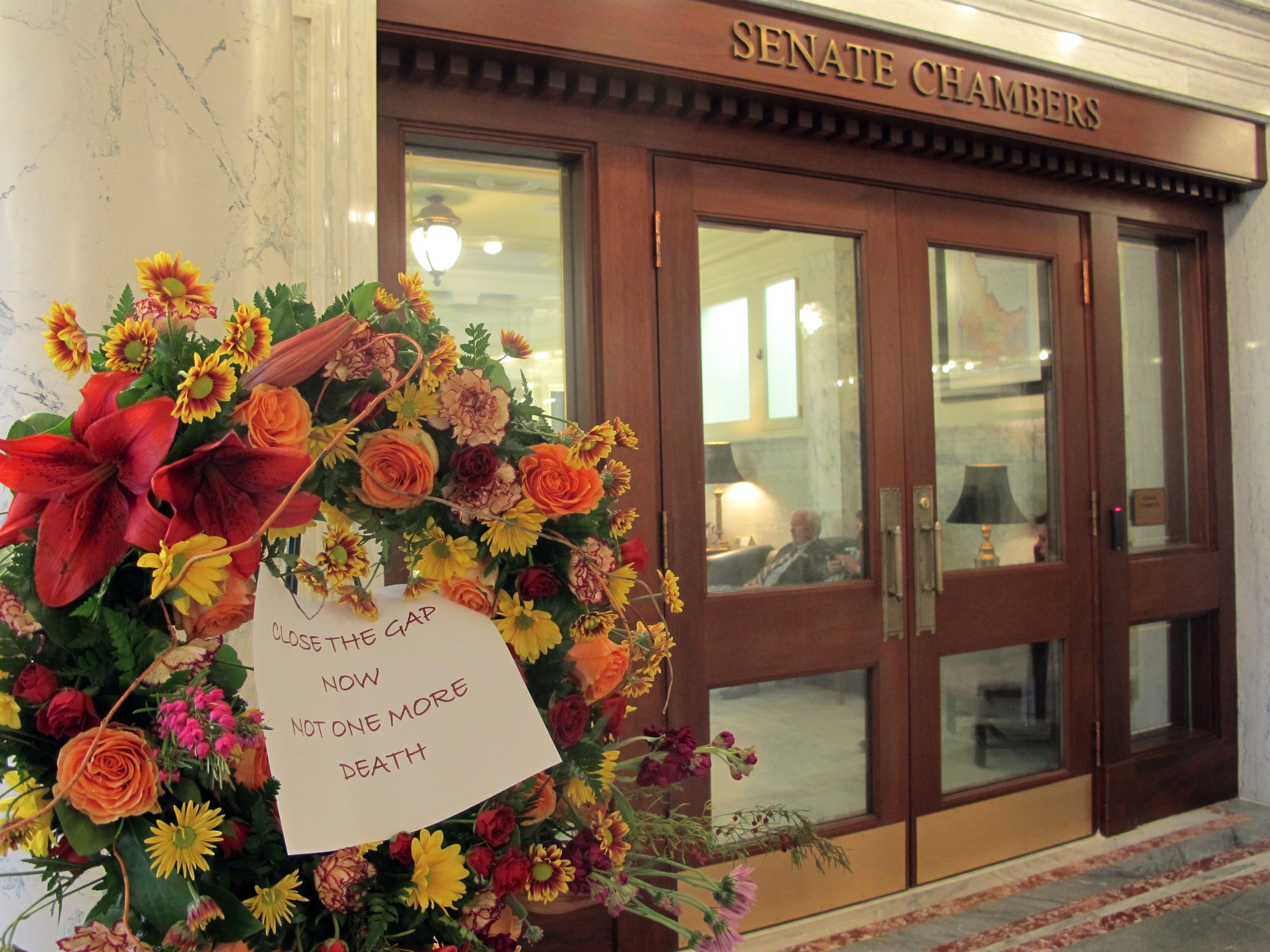Kimberlee Kruesi/Associated Press
A floral funeral wreath was placed outside the Idaho state Senate chambers in March 2016 to protest the body’s failure to pass a Medicaid expansion bill.
The Open Mind explores the world of ideas across politics, media, science, technology, and the arts. The American Prospect is re-publishing this conversation.
In his new Basic Books book “Dying of Whiteness: How the Politics of Racial Resentment is Killing America’s Heartland,” Jonathan Metzl reveals how the backlash policies against a multicultural America have mortal consequences even for the people they promise to help. Metzl is professor of sociology and psychiatry at Vanderbilt University where he also directs the Center for Medicine, Health and Society. He is research director of the Safe Tennessee Project, a nonpartisan volunteer-based organization concerned with gun-related injuries and fatalities.
Alexander Heffner: What did you discover about these resentments and over what period was this?
Jonathan Metzl: My research for the actual book itself started in about 2010. I was doing research in the south in Tennessee and talking to people who themselves would have benefited from the Affordable Care Act. They didn’t want the Affordable Care Act and were on the frontlines of saying they didn’t want Medicaid expansion. And it was just a really eye-opening experience for me because these were people who were very often medically ill and really would have benefited from what was coming down the pike everybody thought with the Affordable Care Act, better access to physicians, help with medical bankruptcies, help paying people’s prescriptions. We started focus groups in the south around that time—2010, 2011 before Trump was a blip on the horizon in terms of the presidency. Probably the most powerful stories that we heard were people who were literally on death’s doorstep, chronic medical illness, liver failure, kidney failure, things like that who would tell me and my colleagues, we’re not going to sign up for this program because even though it might help us, and these were often white working class Americans who we were talking to, they said, we don’t want to sign up for a program that might help immigrants or minorities.
Heffner: So you’re based in Tennessee. You explore the issues in Kansas and Missouri, any other states?
Metzl: Tennessee and Kentucky were a kind of comparison because Tennessee rejected the expansion and the Affordable Care Act and Kentucky accepted it. So it was a kind of Kentucky, Tennessee comparison and then Missouri, Kansas and then looking more nationally at the end.
Heffner: If you look at how people are voting and want to make the correlation between how they responded to your questions and how they behave politically, are they lower income, are they wealthy, because the Republican Party is the party of the 2017 tax reform. It’s a party that benefits from continued support from high-income people.
Metzl: On the practical level, there’s a lot of data and information and history in my book about the mortal consequences for working class white people of GOP policies. On one hand my book it shows that the policies that claim to make white America great again for working class white Americans end up making working class white lives and in particular and many other kinds of lives, harder, sicker and literally shorter. So that part of my argument shows how policies from blocking healthcare reform, letting anyone buy a gun and carry it around, even 18 year olds carry AR-15s, massive tax cuts that undercut schools that those policies are as dangerous for working class people of every, all working class people, including working class white Americans, they’re as dangerous as asbestos or secondhand smoke or not wearing seatbelts in your cars. They literally become disease risk factors that shorten people’s lives. That the story of what’s happening from a medical perspective is that working class white GOP voters are being asked to lay their bodies down on the train tracks to support an agenda that in many ways from a material sense is going to benefit people far higher up the economic chain from them.
Heffner: Let me put it quite plainly, there are rich racist people in this country too.
Metzl: I talked to many, many people. I talked to people in cities; I talked to people in rural areas. I talked to people all across the economic spectrum. And so part of the reason I talk about this as a conversation about whiteness is part of what I highlight in the book are some of the narrative strains that connected people across socioeconomic levels. Even though as I said a moment ago, the real health effects were definitely the worst for people at the lower end of this.
Heffner: Those people who are concerned about not in my backyard. I don’t want policies that are going to advance the lives of people in the city or Mexican Americans or immigrants are those people cognizant of insurance companies who actually benefited from windfall profits of the Affordable Care Act?
Metzl: The answer is yes. I’m not trying to in any way skirt around this question. People were incredibly well informed. I mean, shockingly well informed and I invite people to read the book and the healthcare section. The people who were rejecting the Affordable Care Act knew much more about what the Act actually did than many of my friends in coastal cities who are actually getting healthcare from the Affordable Care Act. So there was no illusion about what was happening with the Affordable Care Act.
Heffner: If you were to assign this book to the governors from Tennessee, Kentucky, Missouri, and Kansas. What would they say?
Metzl: I would love for governors to read this. Honestly, I would love for this to be part of a conversation about politics. I think part of the story here is about the despair that’s resulting from policies in many southern and midwestern states. I wrote this book because I live in Tennessee, I’m from Kansas City, and I saw a lot of people suffering from politics that were problematic, but they were also being manipulated. And so if a governor read this book, I would want them to feel bad about what’s happening on the ground to people. That would be number one. Number two, there’s just a lot of data that shows that the policies that many governors are implementing are shortening life spans. And so I would think if I was an elected official, I would find that alarming to think about how can we make policies that might bolster people’s life spans and not shorten their life spans.



















